Today we’re taking a look back at CPUs released in the last 4 to 5 years, specifically the AMD Ryzen 7 3700X and Intel Core i9-9900K. There’s a good reason why we chose these two CPUs, and it’s not because we believe they were direct competitors; the rationale will become clear in an upcoming follow up review about upgrade paths, but before we get to that we thought a revisit that looks at these two CPUs could be interesting.
At the time of release, one could argue that the Core i9-9900K was in competition with the Ryzen 7 2700X. But that’s somewhat akin to stating that the Radeon RX 7900 XTX is in the same league as the GeForce RTX 4090. While AMD’s product was indeed impressive, it was somewhat slower and priced more affordably.
For instance, the 9900K was introduced with an MSRP of $600, whereas the 2700X was priced at $330. A year later, the 2700X was succeeded by the 3700X. So, you could compare the 9900K with either the 2700X, which arrived 6 months earlier, or the 3700X, which turned up 9 months later.
For this comparison, we’ve gone with the 3700X. Even though it wasn’t the pinnacle of Zen 2 processors, it was the most logical choice for gaming enthusiasts. The dual CCD 3900X and 3950X were tailored more for tasks centered around productivity.

Comparing their MSRPs, the Intel CPU was priced about 80% higher. However, both experienced price reductions as time passed. The 3700X’s lowest price point was $220, and the 9900K briefly sold for $400. The KF model was available for as low as $340, maintaining a 55% higher price than the Ryzen 7 variant.
Regrettably, we didn’t conduct as much extensive CPU testing 4-5 years ago, so we don’t have a thorough comparison between the 3700X and 9900K. However, in mid-2019, we did assemble a 36-game showdown between the 3900X and 9900K. The results showed the Ryzen 9 variant lagging by 6%. This assessment relied on 1080p tests using the GeForce RTX 2080 Ti, with games from that period.
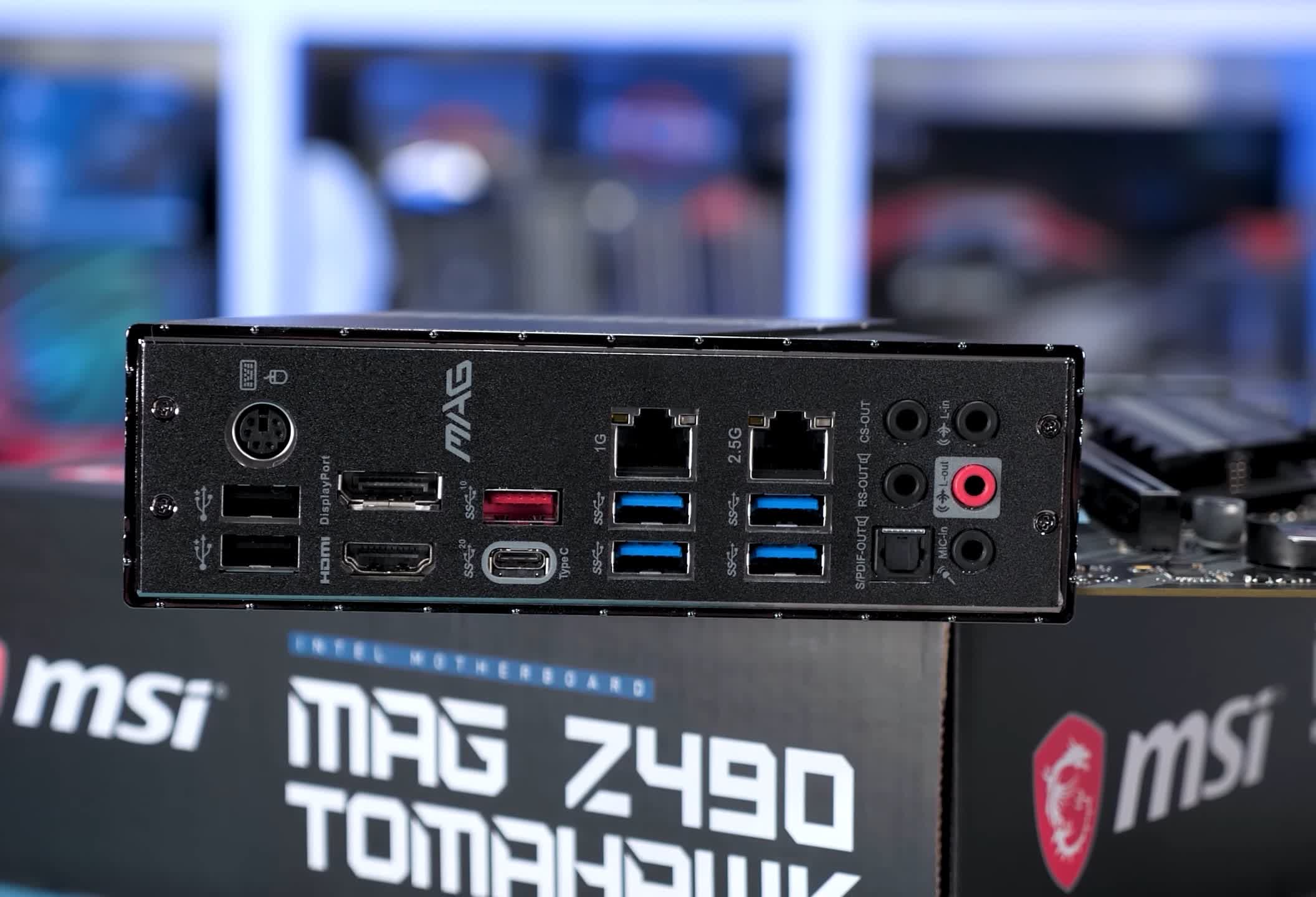
Fast forward to late 2023, equipped with the powerful RTX 4090 and a suite of newly launched titles: How do the 3700X and 9900K measure up? Both CPUs have been matched with dual-rank DDR4-3600 CL14 memory, equipped with the newest BIOS updates, running on Windows 11. Let’s delve in…
Benchmarks
Beginning with Assassin’s Creed Mirage, the performance appears very competitive. The 9900K was merely 4% faster at 1080p. At 1440p and potentially at 4K, the results seem to be CPU-limited. The performance between these two processors is quite similar, marking a favorable outcome for the more affordable Ryzen 7.

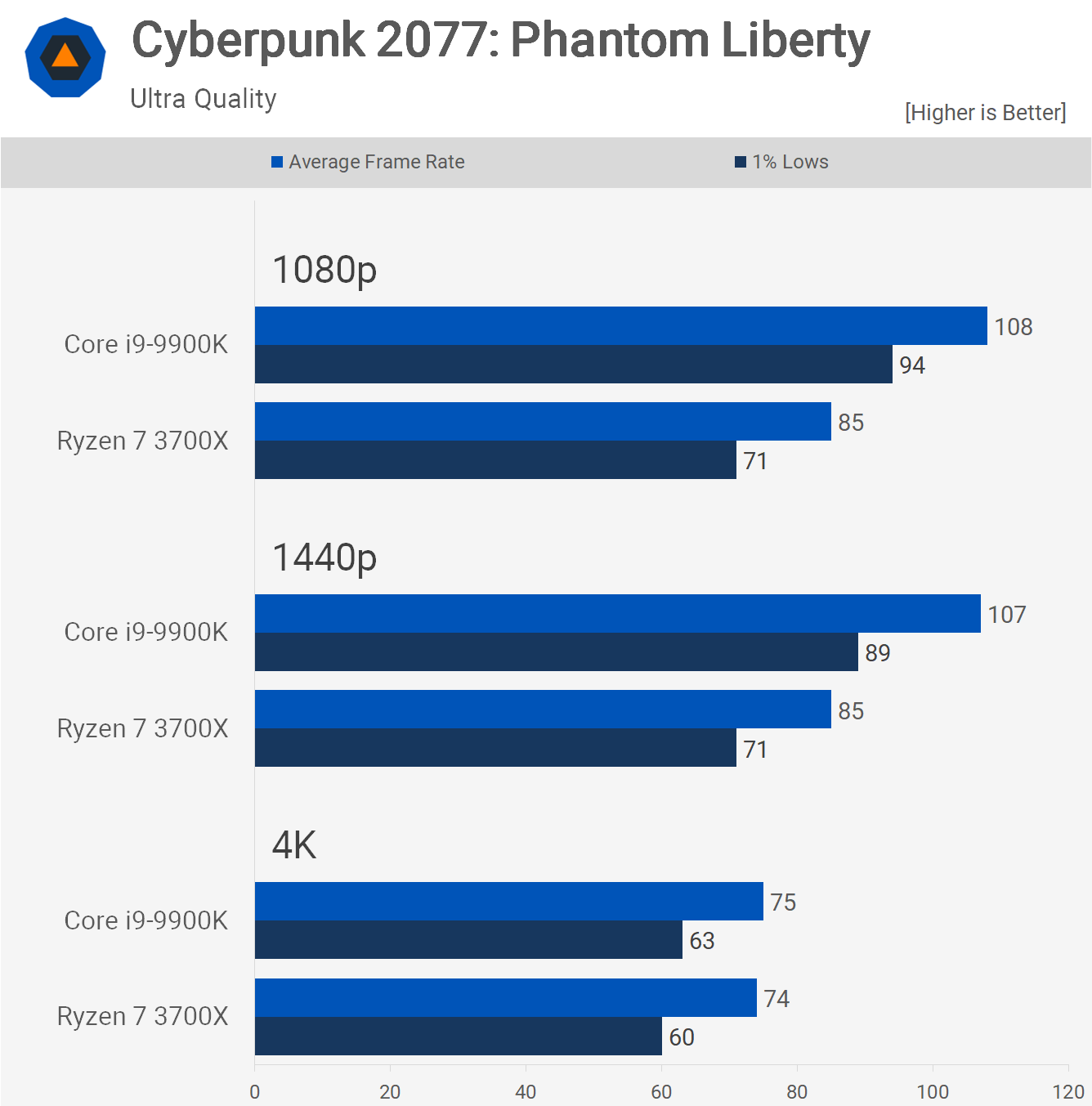
In Cyberpunk 2077, the dynamics change. Here, the 9900K outperforms, delivering 26-27% more performance at 1080p and 1440p. By the time we hit 4K, the data is primarily GPU-limited. While the 3700X does offer playable performance, achieving a high refresh rate could be challenging with this Ryzen processor. Using an RTX 4090 on the ultra preset, the performance gap remains noticeable even when adjusting quality settings with a different GPU.

In Horizon Zero Dawn, the 3700X and 9900K are closely matched. The Intel processor outpaced by only 11-12% at 1080p and 1440p. At 4K, the results are GPU-limited, indicating both CPUs utilize the RTX 4090 to its full potential.
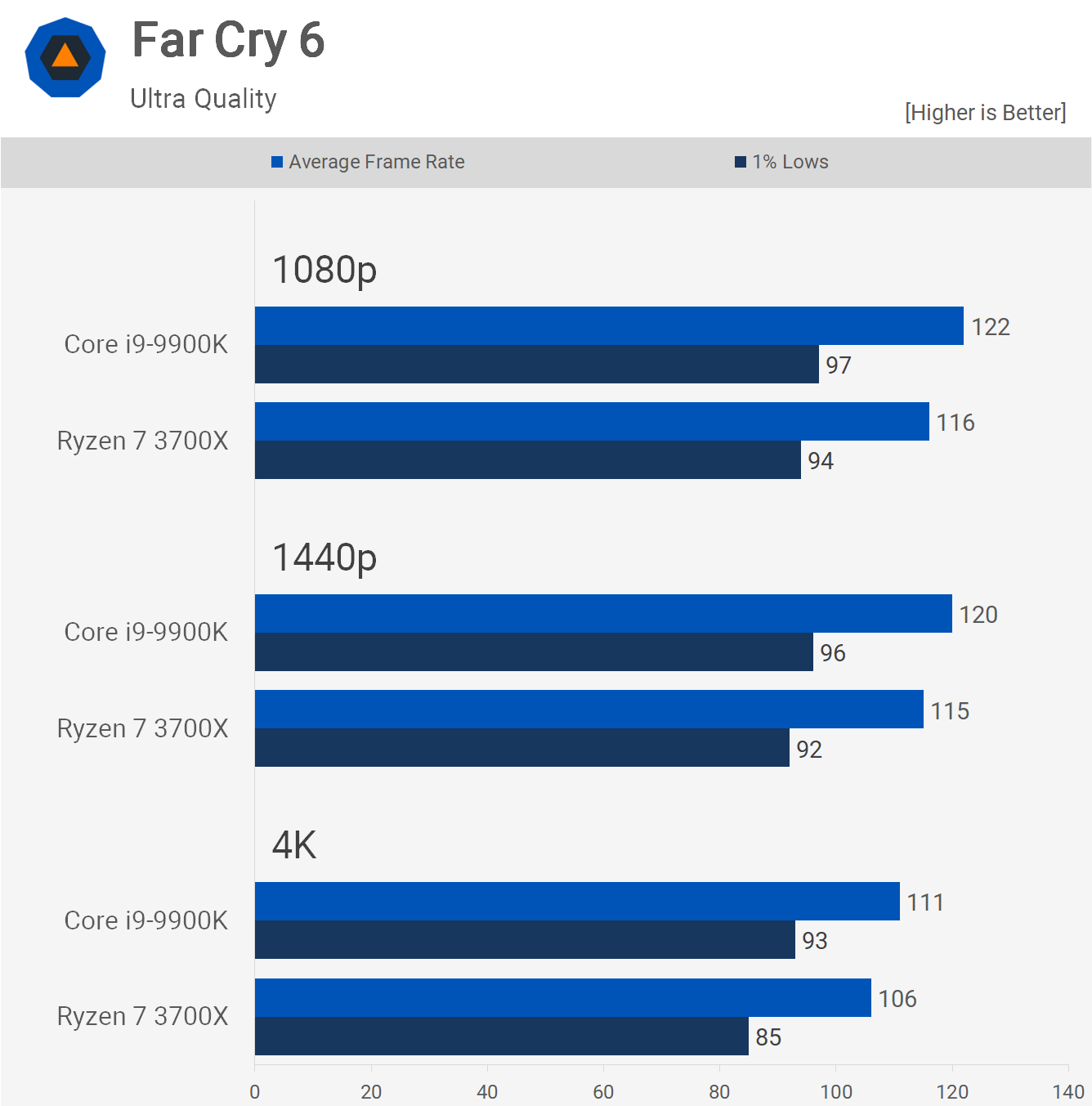
The results in Far Cry 6 are also neck-and-neck. The 9900K edged out by being 5% faster on average. Performance at 1080p and 1440p was CPU-centric for both processors. Interestingly, the 9900K remained superior at 4K.

The F1 23 dynamics mirror what we observed in Cyberpunk. The 9900K displayed a notable performance lead, achieving 170 fps at 1080p, marking it as 26% faster. However, this lead diminished to 16% and vanished at 4K, where the RTX 4090 capped the performance slightly above 90 fps.

ACC is another game where the 9900K shines, especially given its CPU-intensive nature. The Intel processor maintained a 23% performance advantage across all resolutions.

The results for Watch Dogs: Legion are fairly close. The 9900K outperformed by a modest 8% at 1080p. Given the price difference, the marginal gain doesn’t seem too impressive. Distinguishing between 91 and 98 fps at 1080p or a 4% difference at 1440p would be challenging for most.
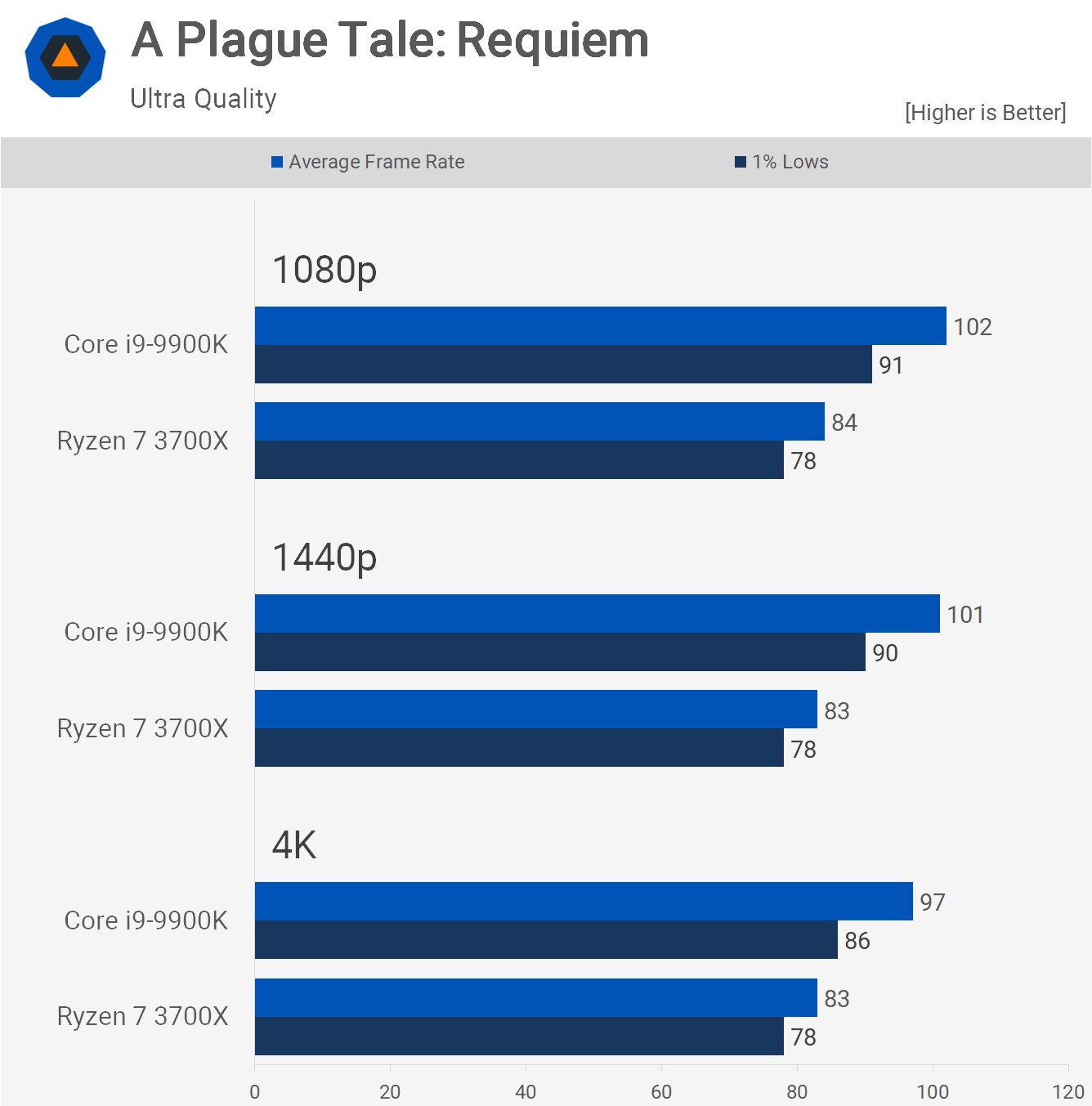
In A Plague Tale: Requiem, the 9900K stands out with a 21% lead, maintaining a 17% advantage even at 4K. This gap is noteworthy.
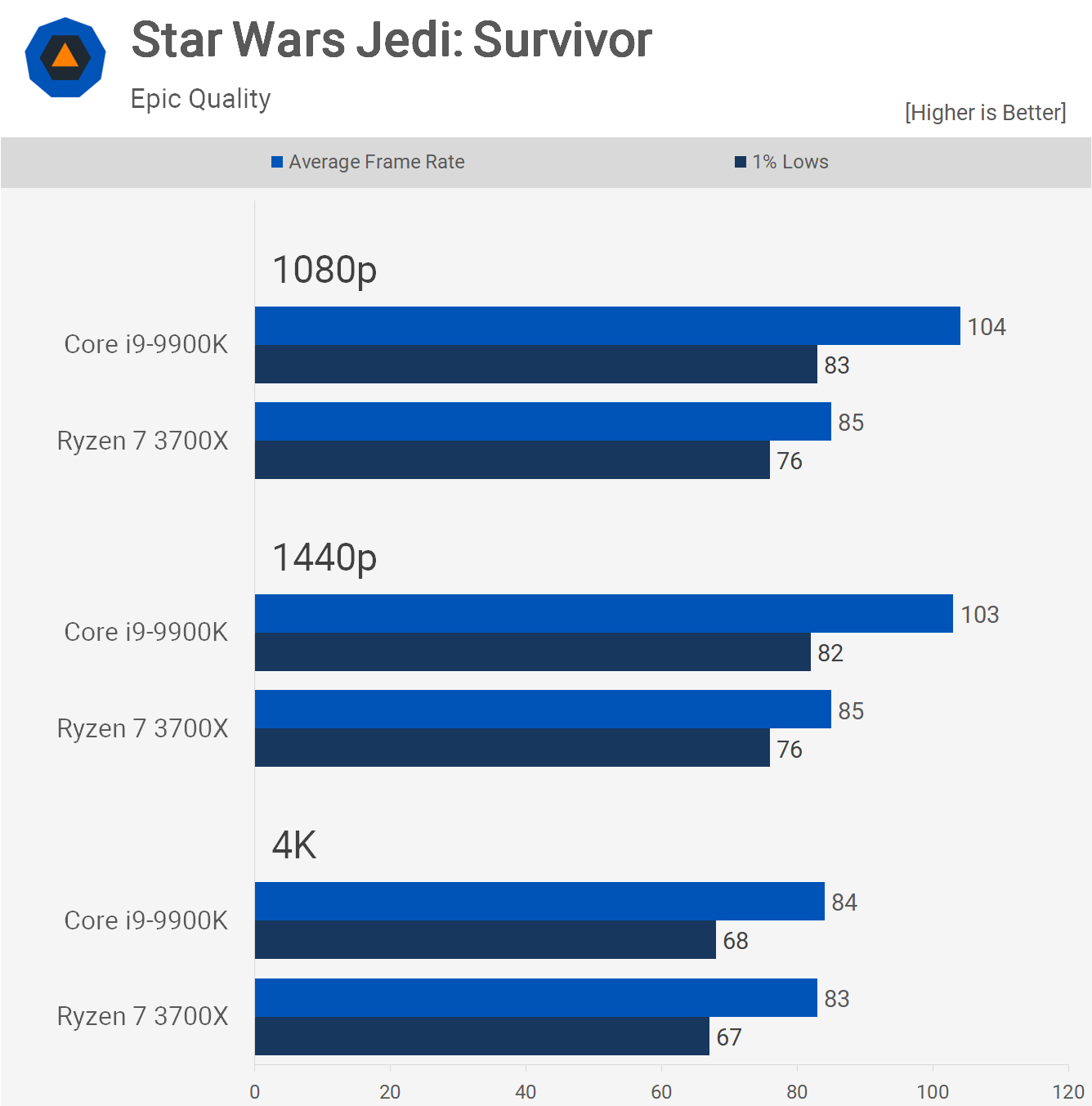
The 3700X capped at 85 fps in our Star Wars Jedi: Survivor tests, making the Intel processor 21-22% faster at 1080p and 1440p. At 4K, GPU limitations come into play. For those seeking a high-refresh-rate experience, the 9900K proves superior.
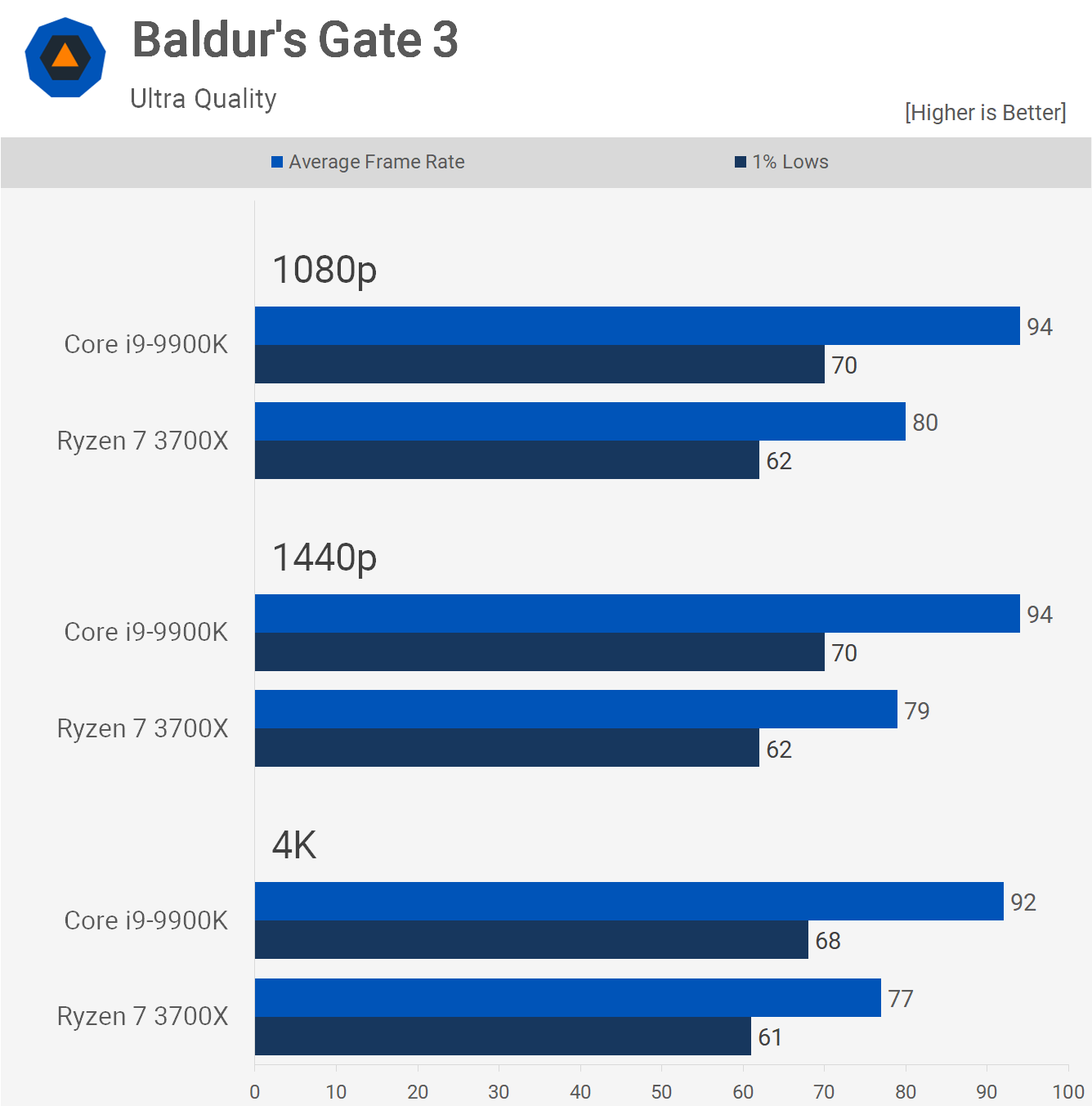
The 9900K managed an 18% lead in Baldur’s Gate 3, elevating performance from 80 fps to 94 fps. The performance boost was evident, albeit at a premium.

In Call of Duty: Modern Warfare II, both processors performed admirably. With the 9900K pushing close to 200 fps at 1080p, the Ryzen 3700X wasn’t far behind, resulting in the Intel CPU being only 7% faster. This game showcases the prowess of the older Ryzen processor.
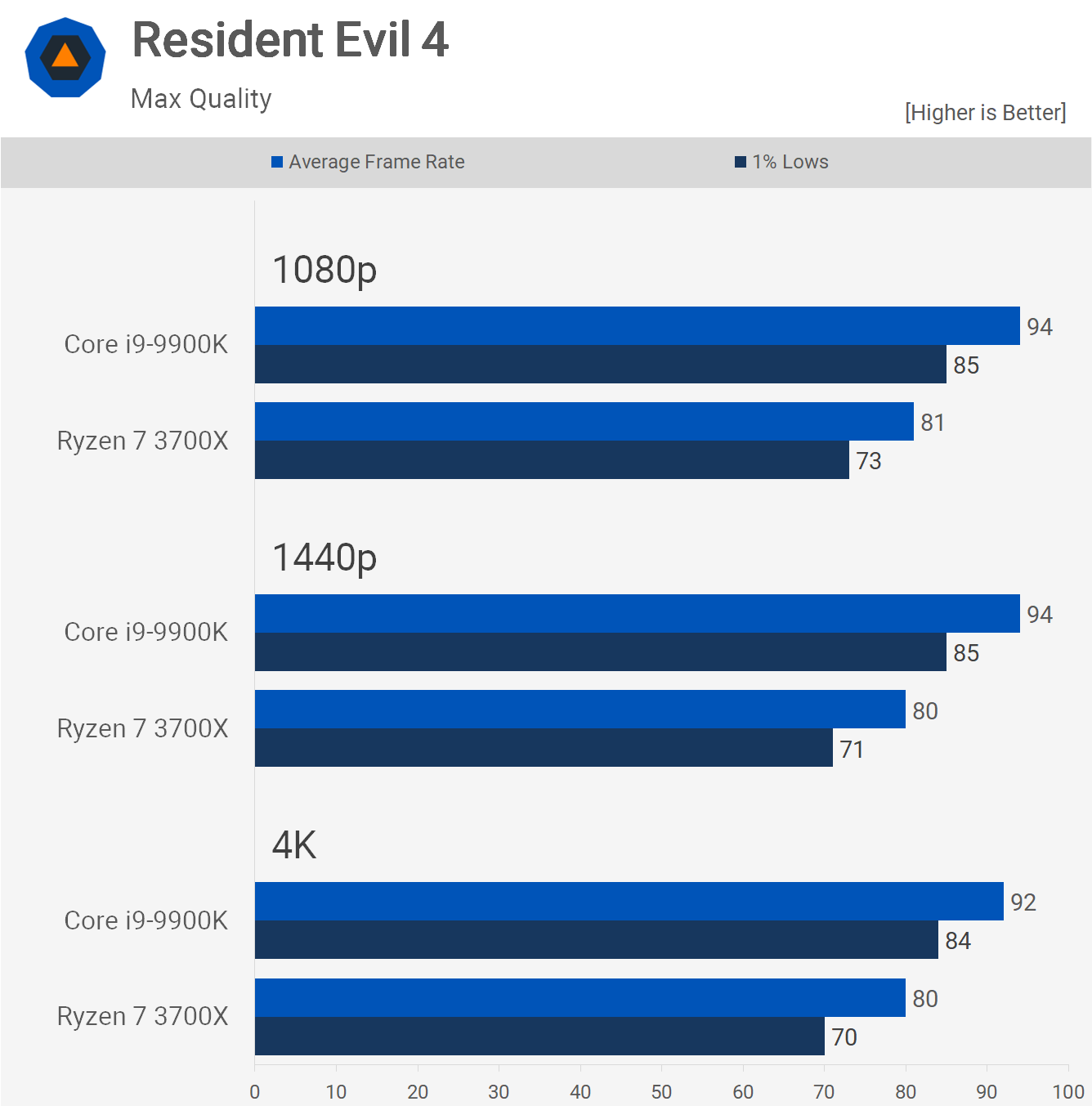
Even with the highest quality preset, Resident Evil 4 is predominantly CPU-bound at 4K, regardless of the processor used. However, the Intel CPU showcased its strength, delivering 16% more performance at the evaluated resolutions.
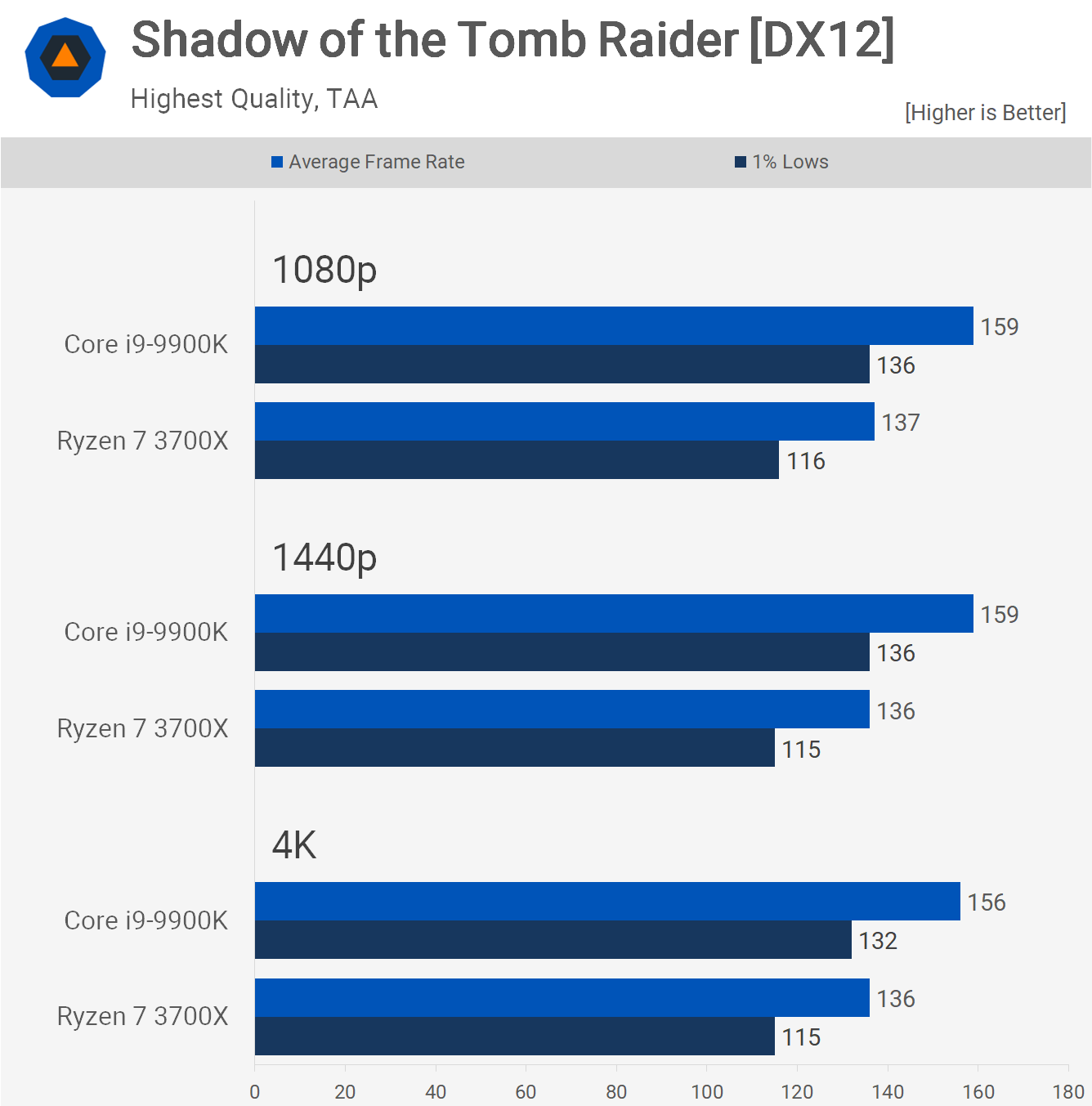
As a nod to nostalgia, we included Shadow of the Tomb Raider. This title remains CPU-limited even at 4K since it predates the RTX 4090. The 9900K offers up to 16% more performance, though the 3700X performs admirably with results well above 100 fps.
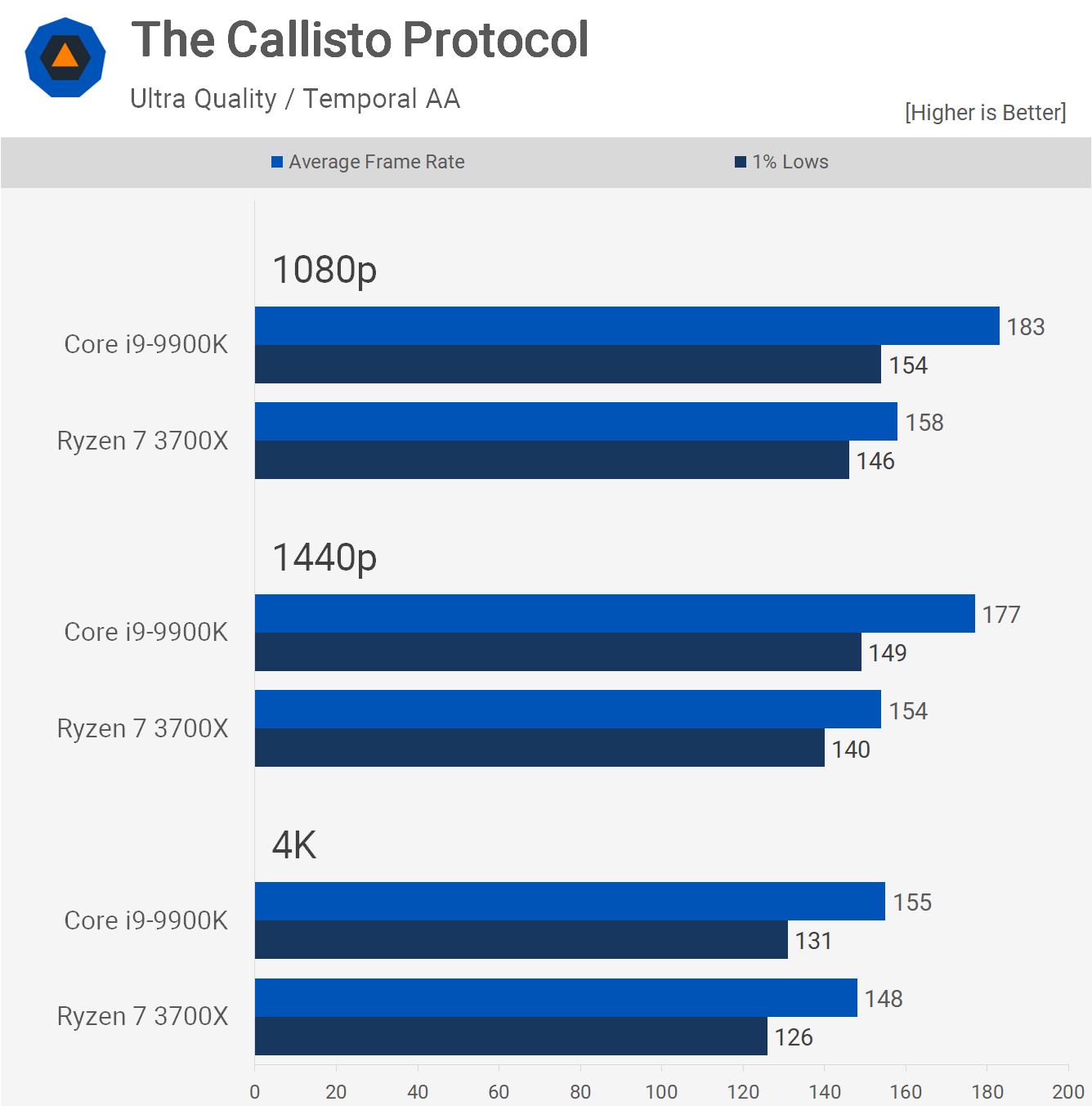
The narrative in The Callisto Protocol is similar. While the 3700X is impressive, delivering over 150 fps, the 9900K still manages to be 16% faster. In isolation, the Ryzen’s performance in this game is satisfactory, even if the Intel chip takes the crown.

The 3700X performs notably in Total War: Warhammer III, achieving slightly over 160 fps at 1080p. This makes the 9900K only 7% faster, indicating closely matched results. As frequently observed, performance at 4K is entirely GPU-limited.
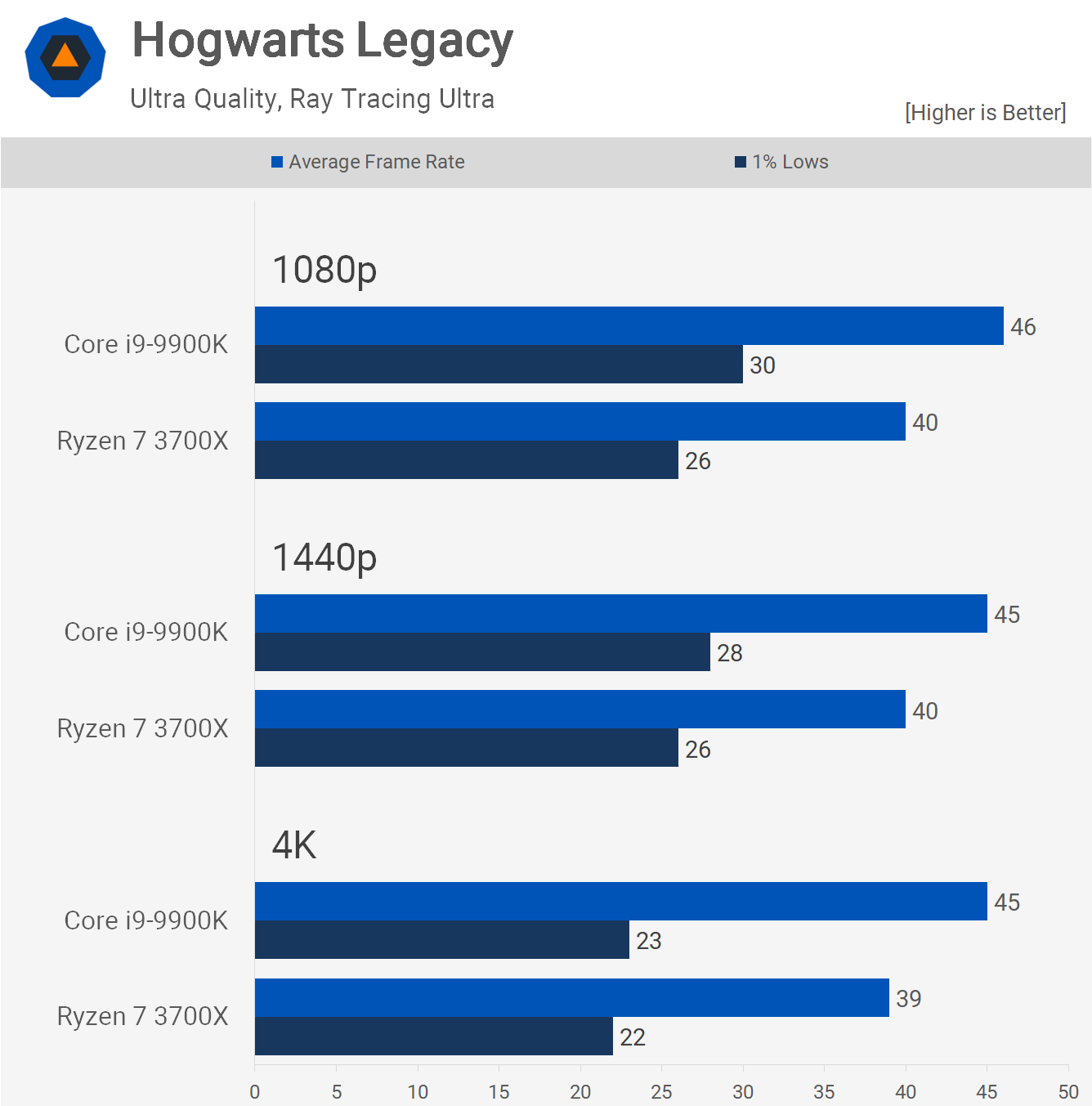
In Hogwarts Legacy with ray tracing enabled, we find ourselves heavily CPU-limited across all test configurations. This limitation restricts the RTX 4090’s performance, even at 4K. However, the 9900K manages to be 15% faster, indicating a substantial performance increase.
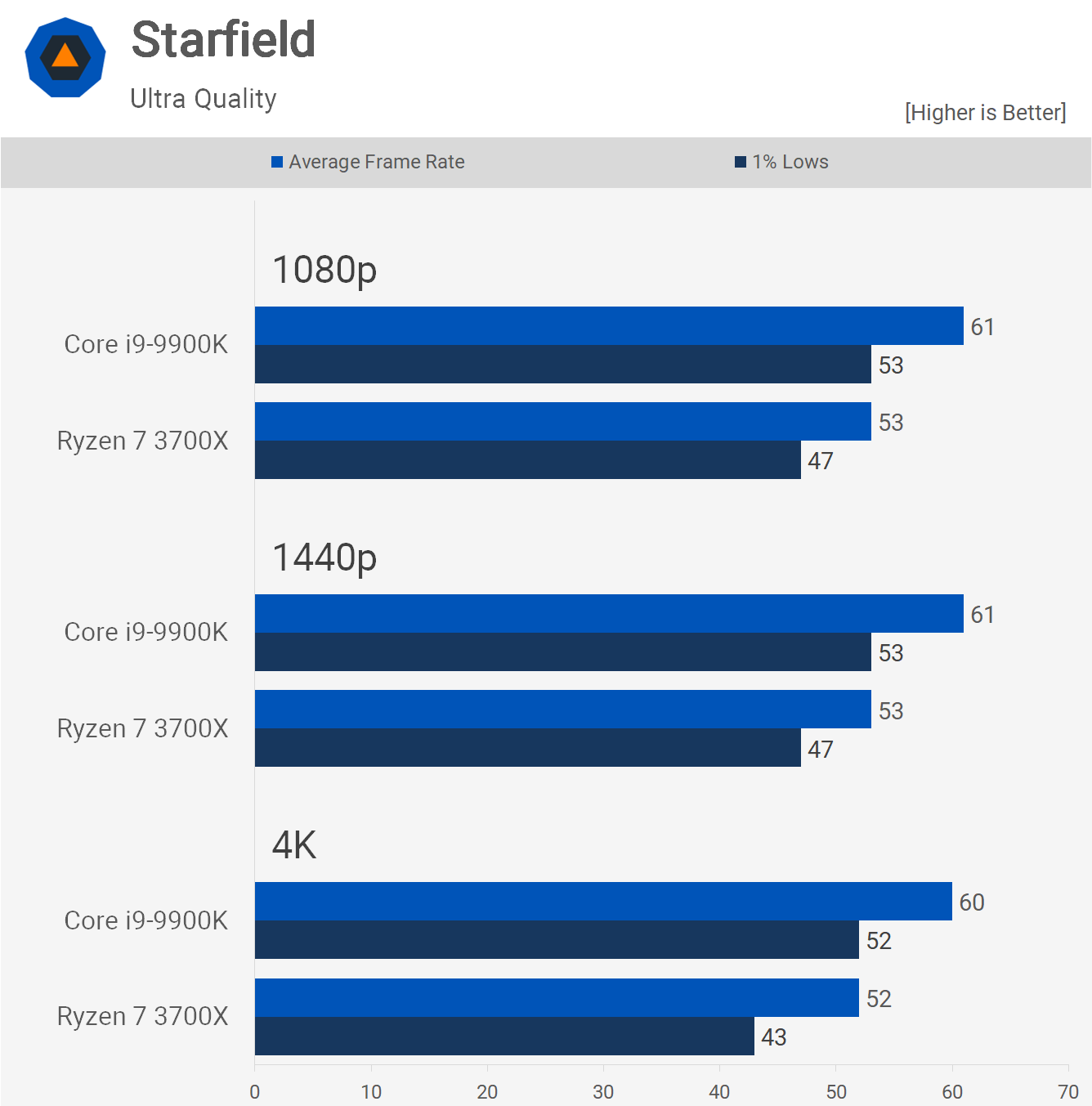
Starfield presents a similar situation. Across all resolutions, the results are CPU-limited, with the Intel processor outperforming by 15%.
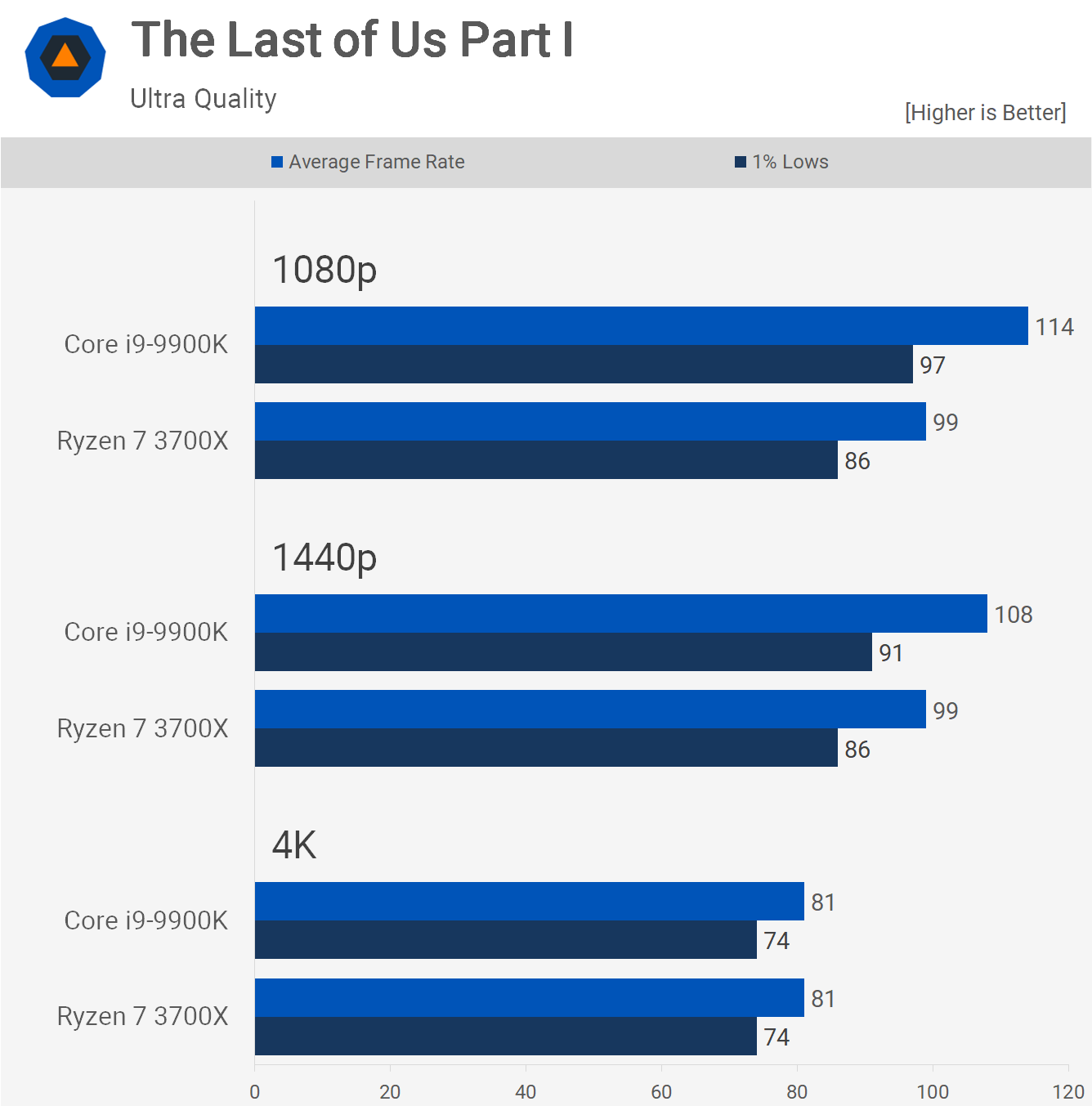
In The Last of Us, the 9900K boasts a 15% performance lead at 1080p and 9% at 1440p. By the time we reach 4K, the RTX 4090 caps the performance at an average of 81 fps. Notably, while the Intel processor had the edge at 1080p, the 3700X still managed a strong 99 fps on average, ensuring a smooth gaming experience.
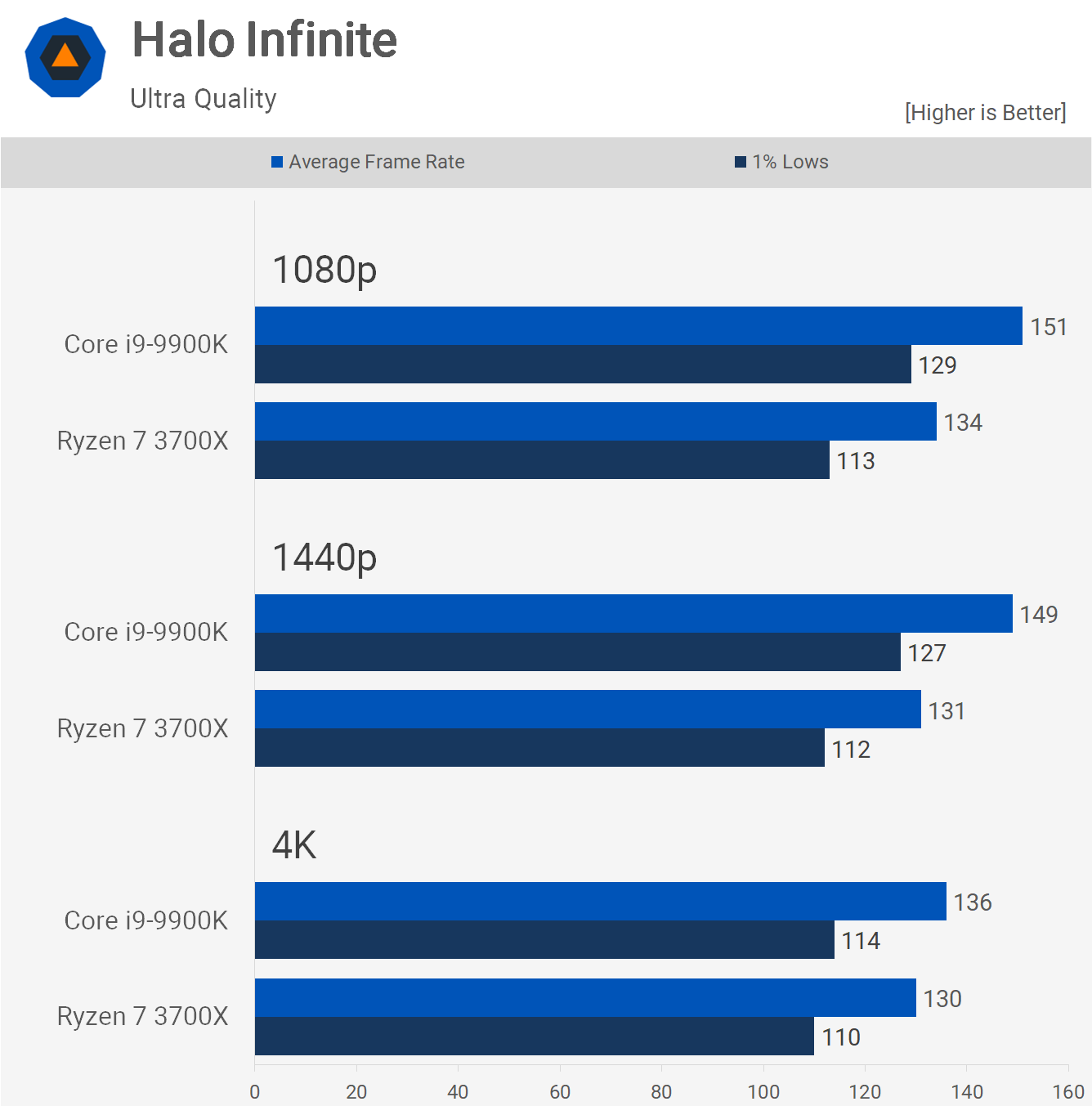
Halo Infinite shows similar trends with the 9900K outperforming by 13-14% at 1080p and 1440p and by 5% at 4K. Importantly, the 3700X maintained over 130 fps, guaranteeing another satisfactory gaming session.
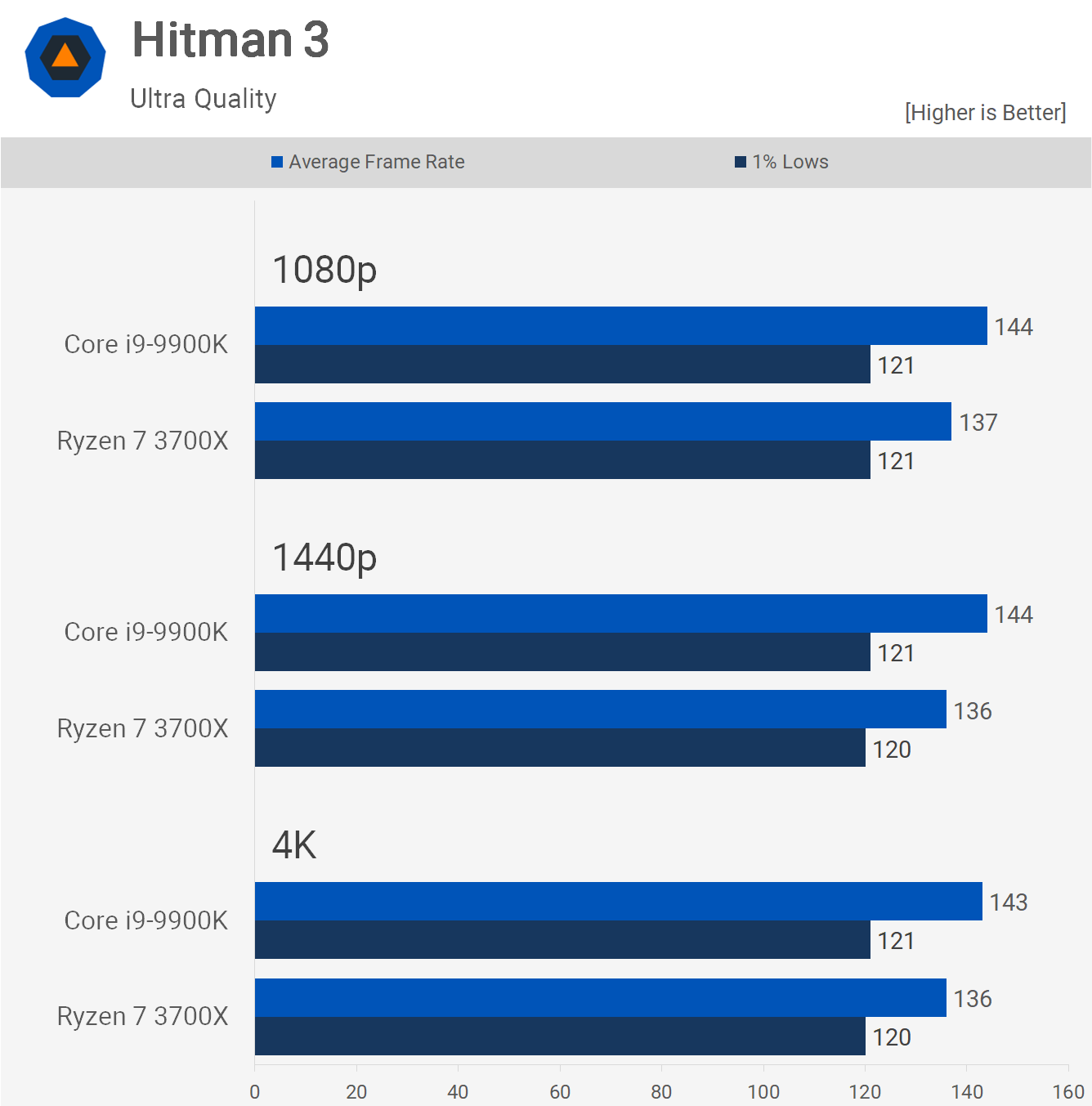
Hitman 3 presents an intriguing scenario where the performance gap is narrower. Here, the 9900K is ahead by a mere 5%, with all results being CPU-limited, even at 4K. The 3700X showcases strong performance in this title.
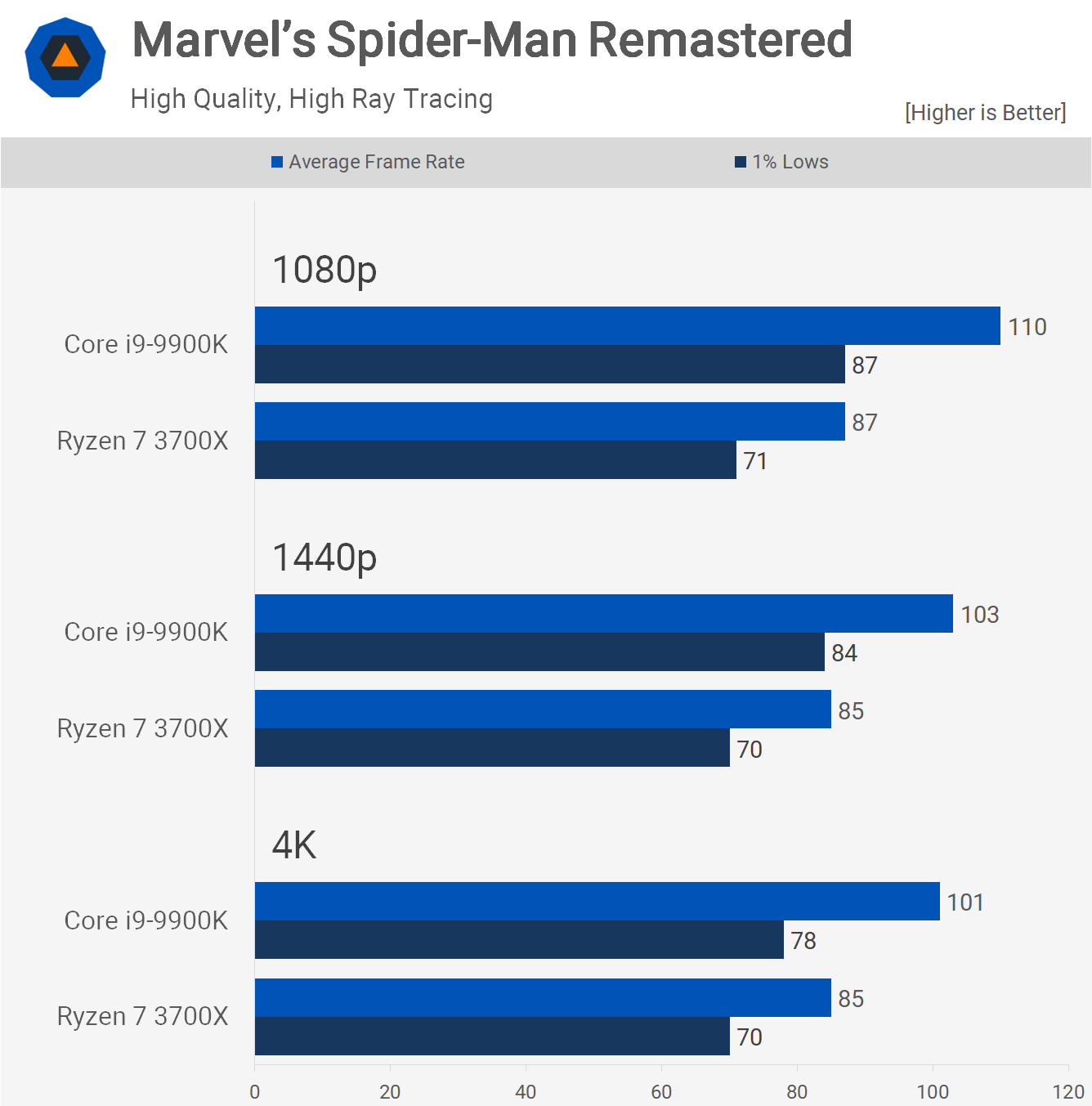
Concluding with Spider-Man Remastered, the 9900K has a distinct lead of 26% at 1080p and 21% at 1440p. Even at 4K, the Intel processor maintains a significant 19% advantage. The 3700X does offer a playable experience, but the gaming session on the 9900K, particularly on high-refresh rate monitors, is undeniably superior.
Performance Summary
Having examined the 21 games tested… and surprise, surprise, the much more expensive CPU was faster, but how much faster overall? Well, let’s take a look, starting with the 1080p data.
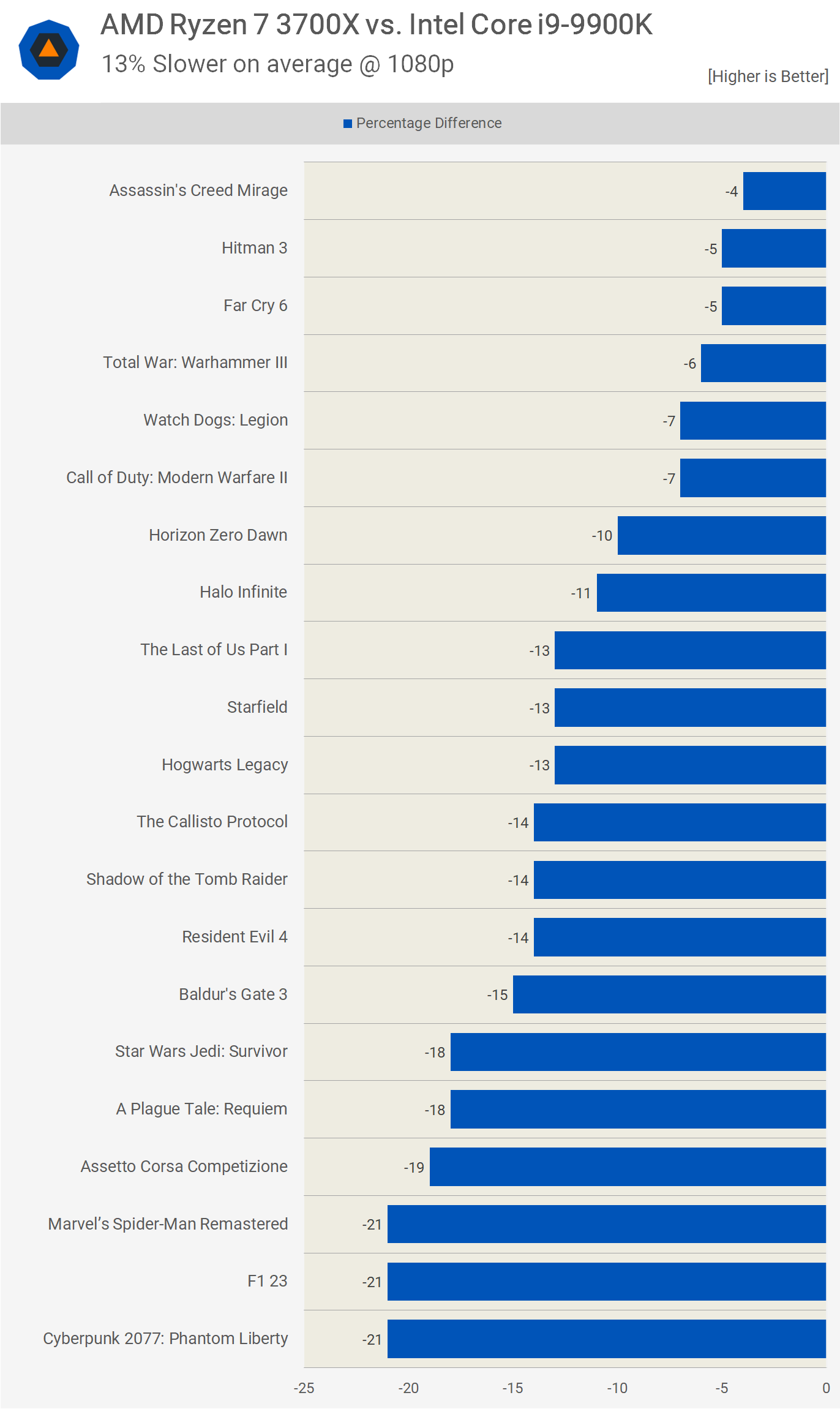
At this resolution, the 3700X lagged behind by as much as 21% in the most extreme cases. Given that it was priced at 45% less, the Ryzen 7 part still offers considerable value. On average, it was behind by 13%, a noteworthy margin for a CPU.
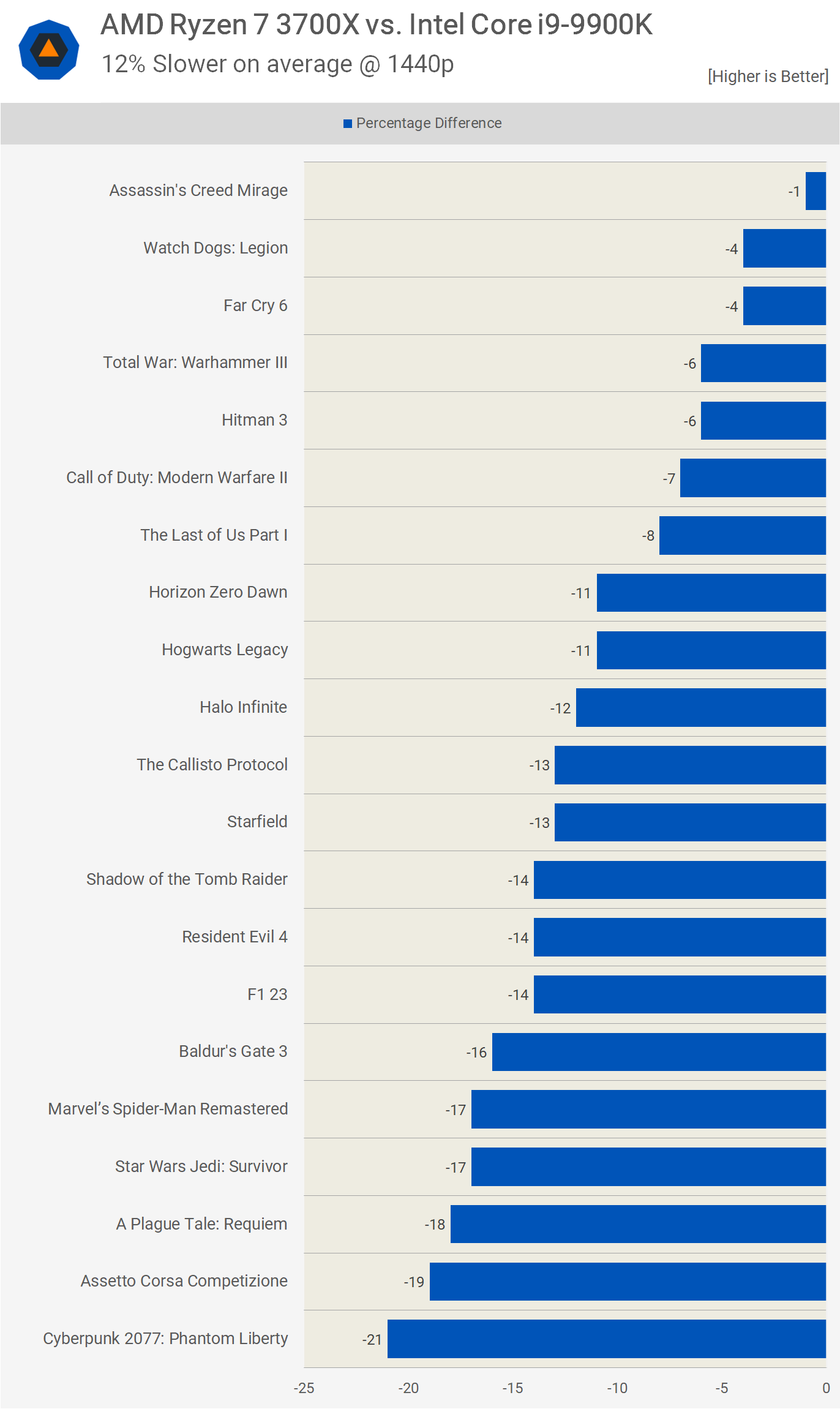
At 1440p, the performance gap slightly reduced to 12%, mirroring the results at 1080p. While there was only one instance where the 3700X was 21% slower, 14 games showed it trailing by more than a 10% margin.
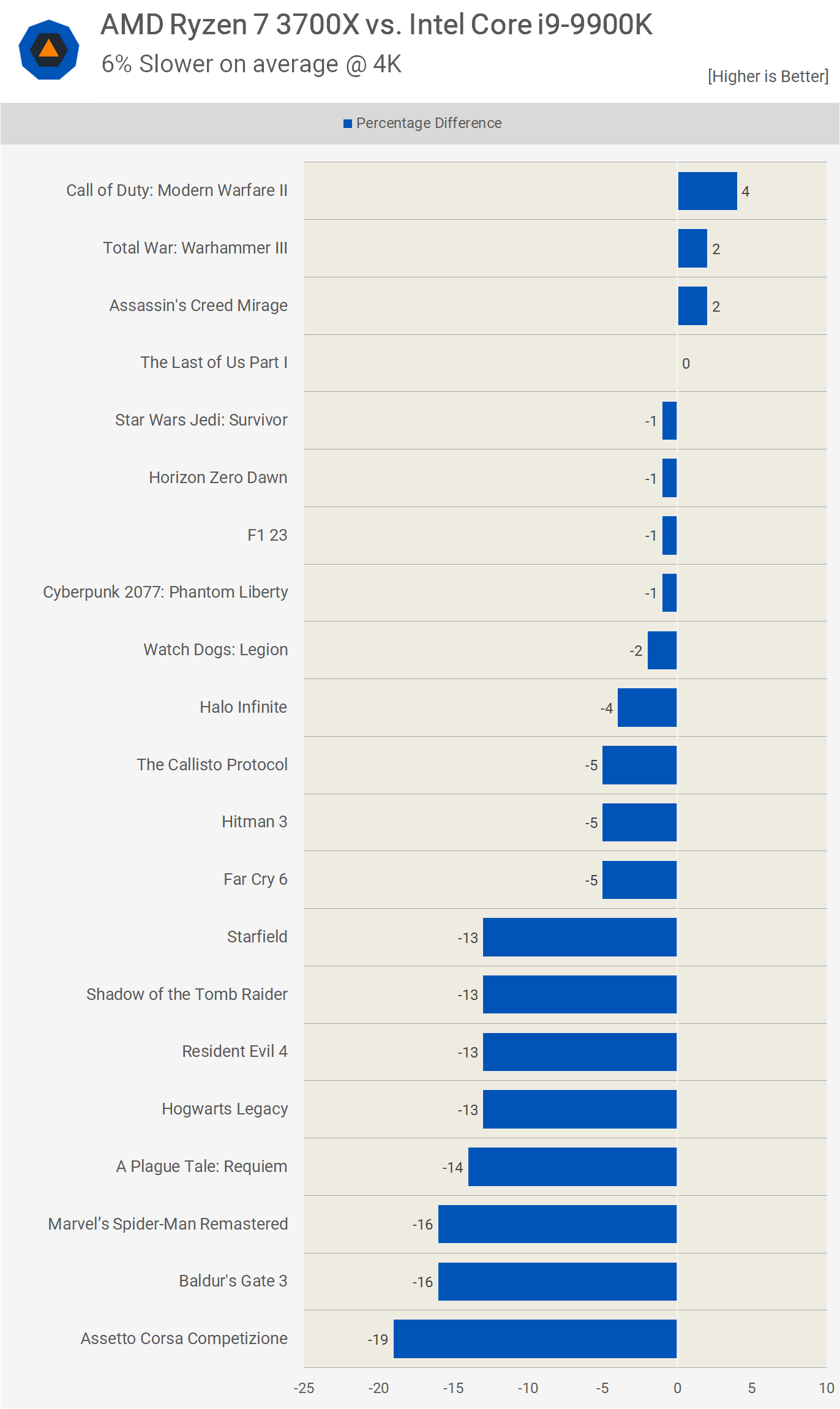
Moving on to 4K, the outcomes were primarily constrained by GPU performance, leading the 3700X to be a mere 6% slower. Nevertheless, in 8 of the tested games, the difference exceeded 10%, which is significant. It’s worth noting, however, that our tests utilized an RTX 4090. Thus, for CPU benchmarking, the data from lower resolutions is more relevant.
Which CPU Was or Is Better?
It’s fascinating to recall how these CPUs were the center of numerous online debates between AMD and Intel enthusiasts. In hindsight, both the Ryzen 7 3700X and Core i9-9900K are outstanding processors that are worthy of recommendation, in fact, we did recommend both.
The 9900K was consistently hailed as the ultimate gaming CPU, the no-compromise solution for those seeking unmatched performance. In contrast, the 3700X was prized for its stellar value – an affordable eight-core CPU with SMT support for 16 threads, delivering unbeatable productivity performance at the $300 price point.
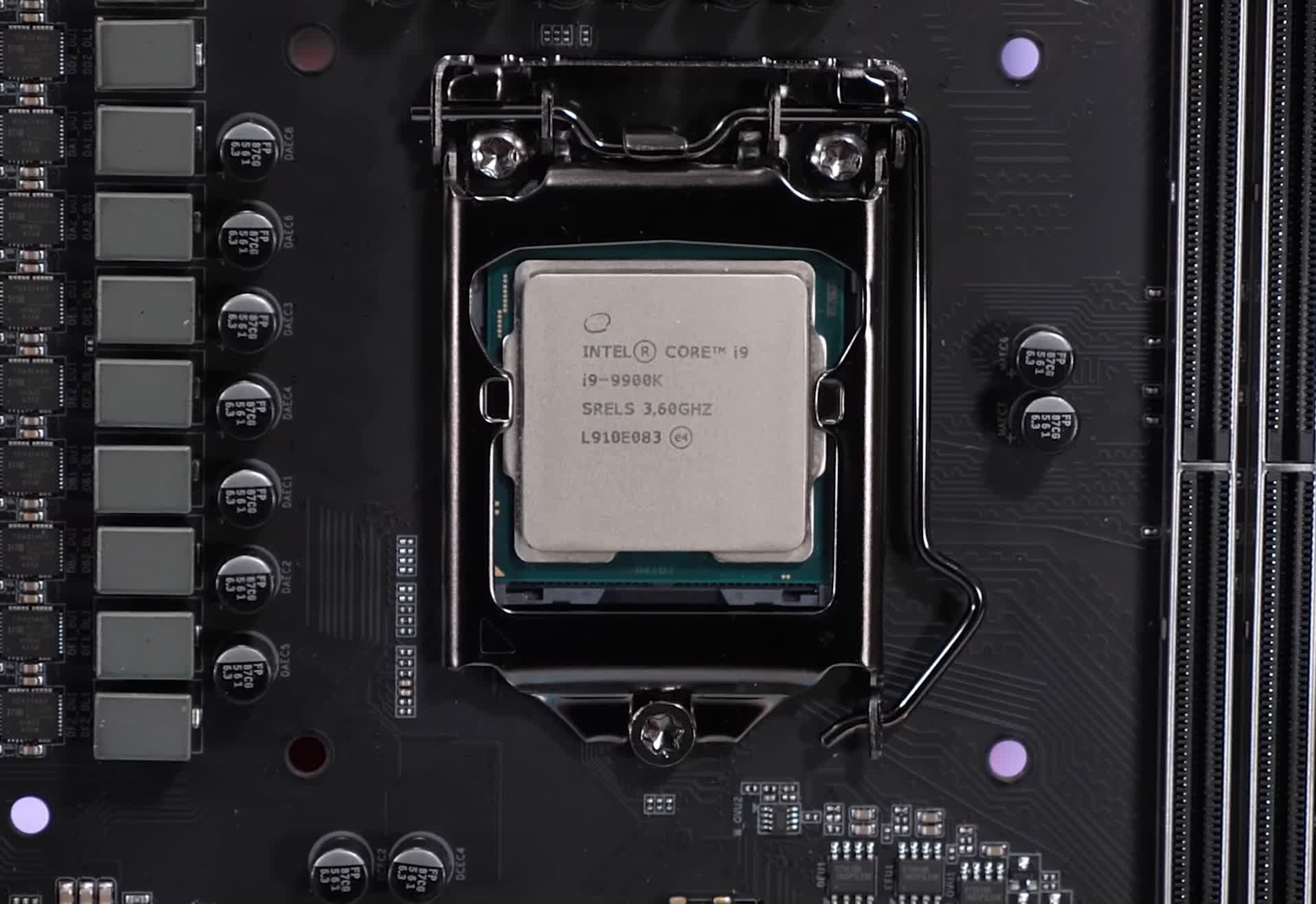
Back then we perceived this less as an AMD vs. Intel rivalry and more as a situation where these CPUs could conceivably be from the same manufacturer. They didn’t directly compete, primarily because one was priced around $600, and the other at approximately $300.
Instead, the Core i5-9600K at $260 or Core i7-9700K for $380 were better priced to compete with the 3700X. Strictly for gaming, the i5’s and i7’s were very competitive, but if you planned on doing any core-heavy productivity, they got rinsed by the 3700X. It would be interesting to go back and add the Core i5 to the data, so that might be something we could do soon.
Fast forward 4-5 years, and the Core i9-9900K remains the superior gaming CPU. That said, the 3700X has stood the test of time and remains competent. Purchasing it in 2019 for $330 would’ve felt worthwhile, even more so for those who got one for around $200.
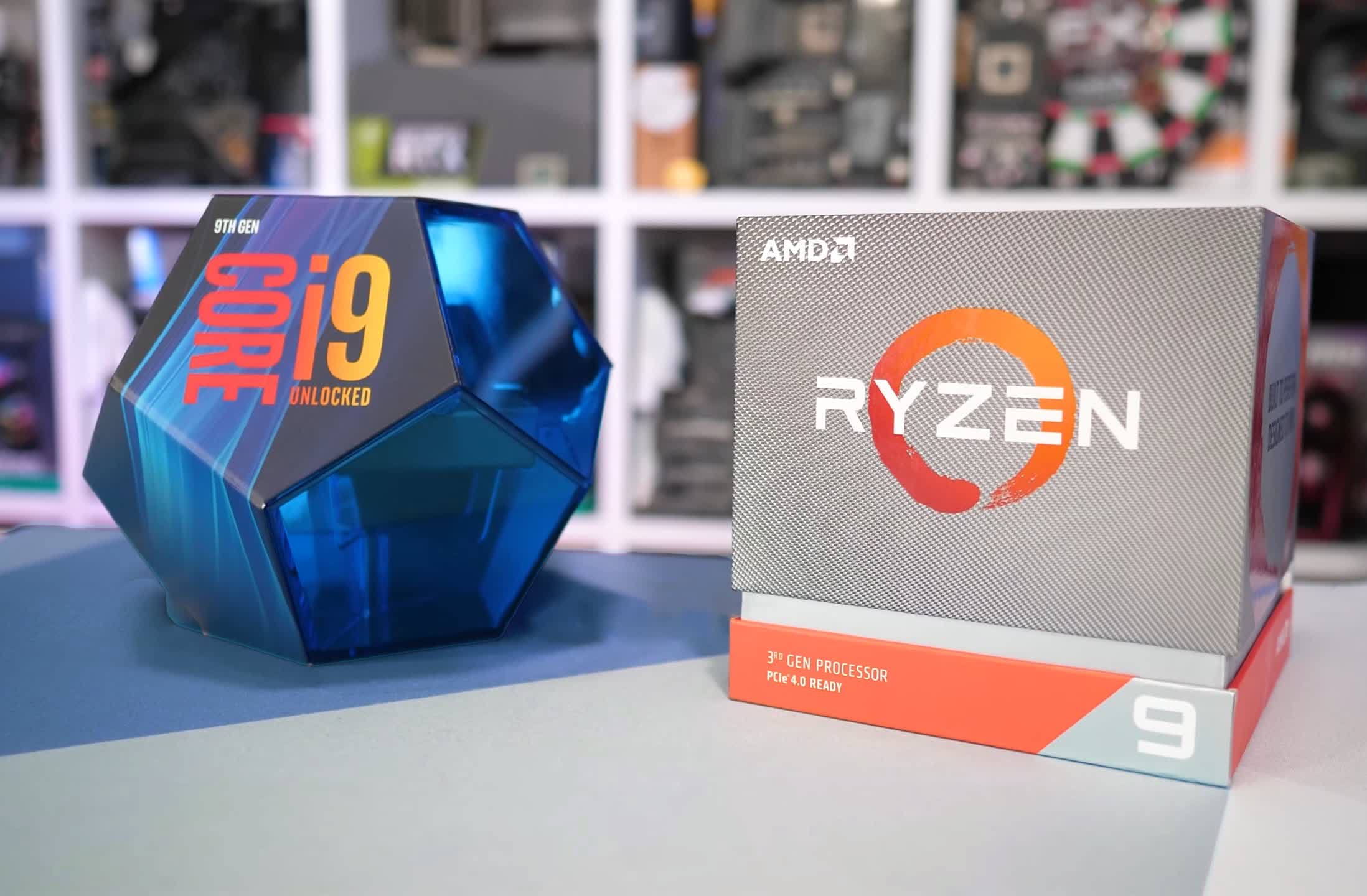
In tests featuring predominantly modern games with an RTX 4090 at 1080p, the 3700X was 13% slower – a respectable outcome considering the modest price tag.
Some will no doubt question the use of the RTX 4090, but such criticism is misplaced, particularly given the fact that in many new games GPU performance was irrelevant given how heavily CPU limited we were, even with the 9900K. Take the Starfield results: the 9900K managed only 61 fps, achievable with a 6800 XT. Thus, whether using the RTX 4090 or 6800 XT, outcomes would be consistent, with the faster RTX 4090 ensuring a proper CPU performance evaluation.
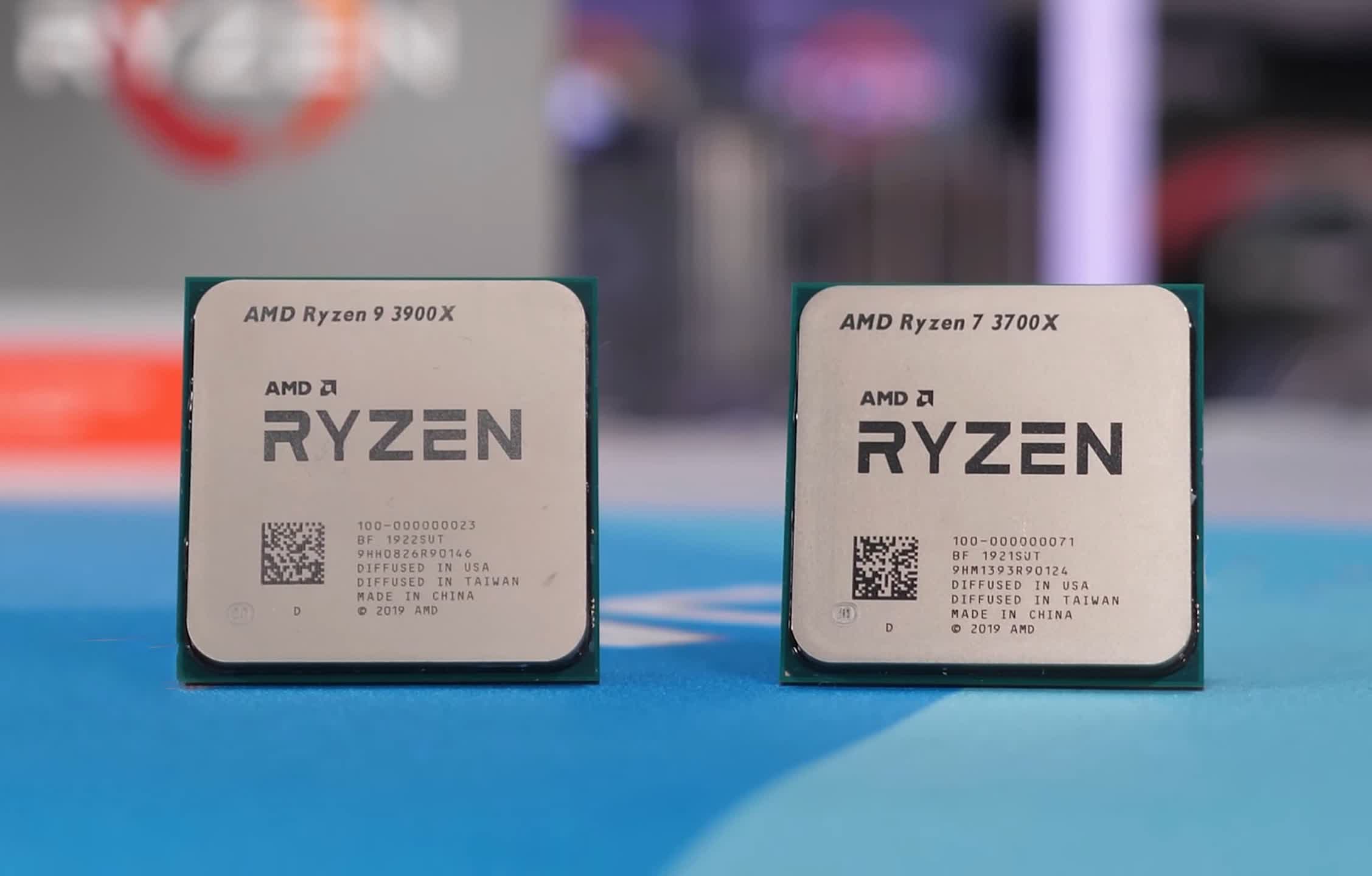
Hogwarts Legacy did pose challenges for both the 3700X and 9900K though. In Starfield, the 3700X slightly missed the 60 fps mark, while the 9900K barely made it. Signs that indicate the Ryzen 7 processor’s diminishing prowess.
The good news for Ryzen 3700X owners is that you can upgrade to a 5800X3D, at a very reasonable cost. Right now you can pick one up for just $320 and it will slot into and work on your existing motherboard… chances are, some of you have already done that. Sadly, those rocking a 9900K will have to purchase a new motherboard, possibly new memory, too, if you wish to make a real upgrade.
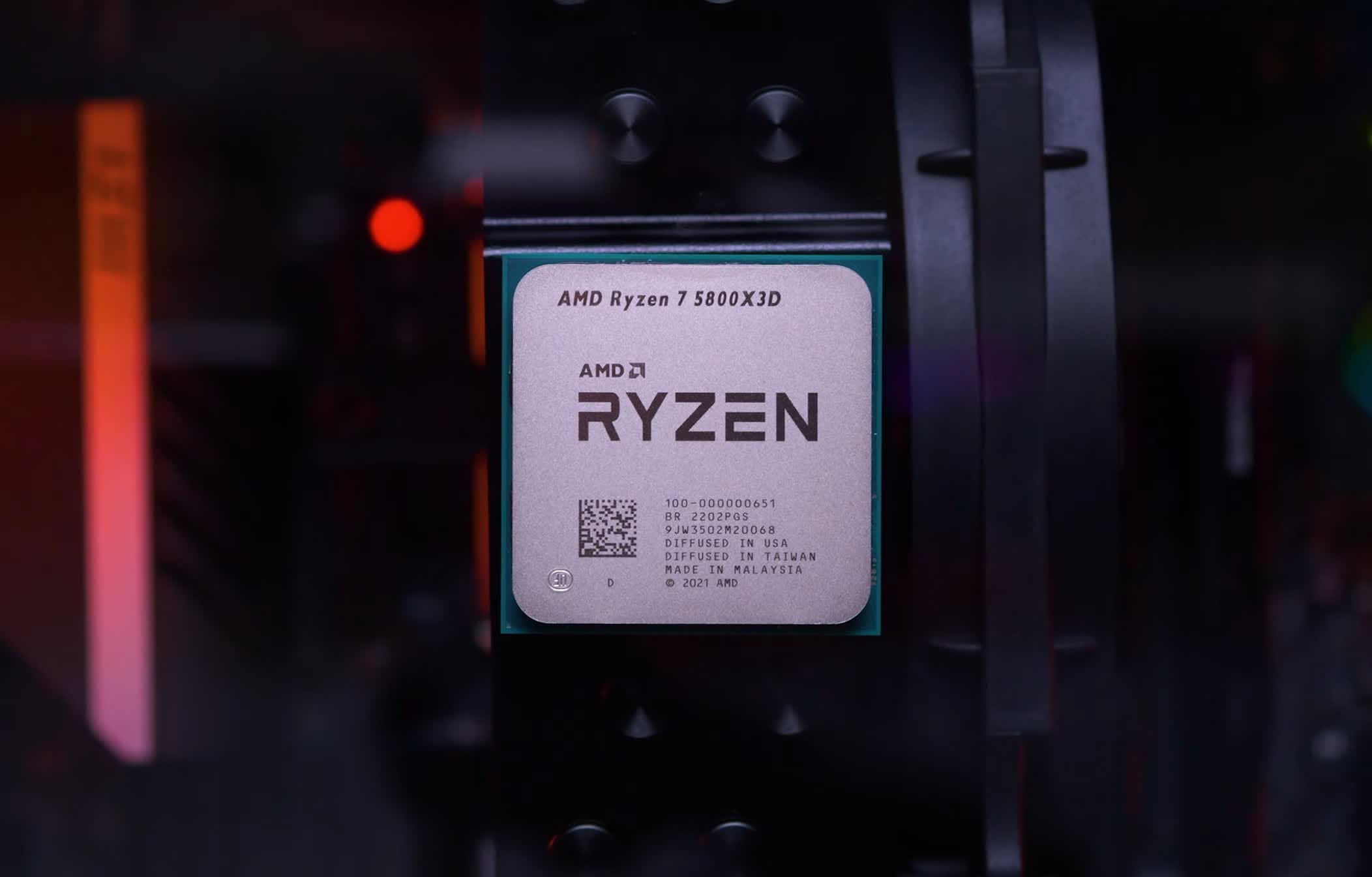
Parts like the Core i5-13600K offer great value at $310, but you’ll also need a motherboard and decent Intel Z790 boards start at $190. You’ll also want some DDR5 memory to get the most out of the 13600K, so add another $100 for a decent 32GB kit. That’s a big cost for what will net you less than 10% more gaming performance than the 5800X3D – and that’s comparing 1080p performance using an RTX 4090. Of course, you can go with a DDR4 motherboard and keep your memory, and doing so would land you similar gaming performance to that of the 5800X3D.
In short, initial investment in the 3700X, followed by an upgrade to the 5800X3D, would match the expense of solely purchasing the 9900K which was the better gaming CPU to begin with. It’s an interesting way of going about it and we’re not sure which path was the best one to take, so in part 2, as a follow up to this revisit, we’ll be adding the 5800X3D to see how it compares with the 9900K.
Still, keep in mind these products catered to distinct price brackets, so a choice between the 3700X and 9900K was somewhat uncommon. But it’s still an interesting look back at which option made the most financial sense: a one-time investment in the 9900K or gradual upgrades with AM4? A concrete conclusion might elude us, but the exploration remains one we plan to take on.

